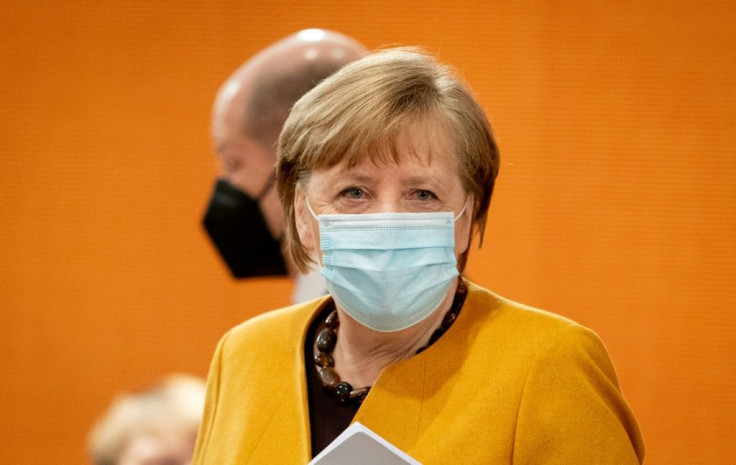German Cabinet Agrees Record Levels Of New Debt For 2021
The German government agreed Wednesday to take on record borrowing this year to weather the economic blow of the coronavirus pandemic.
In budget adjustments signed off by Chancellor Angela Merkel's cabinet, Europe's largest economy will borrow a total 240.2 billion euros ($284 billion) in 2021, a third more than initially planned.
The adjusted budget, which will see Berlin break its taboo on new debt for the third year in a row, still has to be approved by parliament.
"We have decided to suspend the debt brake once again, and I think that's justified," Merkel told the Bundestag lower house, adding that the budget was "measured" despite "more insecurity" than usual.
"We are taking the right measures to manage the economic and financial effects of the pandemic," added Finance Minister Olaf Scholz.
After maintaining a budget surplus for the last decade, the economic slump caused by the pandemic has forced Berlin to take on 370 billion euros in new debt in 2020 and 2021, with an extra 85.1 billion planned for 2022.
With the country facing a dangerous third wave and shutdown measures extended into April, Germany's recovery has proved slower than expected this year.
Having originally planned to halt borrowing in 2022, the government is now aiming to return to its golden rule of fiscal discipline a year later, with only 8.3 billion euros of new debt in 2023.
The so-called "debt brake" is a rule enshrined in the constitution which forbids the government from borrowing more than 0.35 percent of gross domestic product (GDP) in a year.
Germany smashed the taboo in 2020 and 2021 as it scrambled to shield businesses and workers from the economic hit of the coronavirus.

The state has already paid out more than 114 billion euros of financial support to businesses since the beginning of the pandemic in the form of guaranteed loans, direct aid and shorter-hours work schemes.
Yet according to a report published by the German Economic Institute on Wednesday, the crisis has still cost the German economy 250 billion euros so far.
Hopes of a recovery this year have been dashed with entire sectors of the economy idled for months and the government revising down its 2021 growth forecast to three percent in January.
As a third wave of the pandemic tears through Europe, Germany extended shutdown measures by another several weeks at a marathon meeting between Merkel and state premiers on Monday.
Though plans for a strict five-day lockdown over Easter were scrapped Wednesday, businesses such as non-essential shops, leisure facilities and cultural venues will still remain largely closed until at least April 18.
In a report published Monday, the Bundesbank central bank predicted that restrictions would see economic output "contract markedly" in the first quarter of 2021.
The measures have also been met with growing frustration from business organisations, with the German Commerce Association warning that 120,000 shops could be forced to close if the measures continue to drag on.
The issue of taking on new debt, meanwhile, has also sparked heated political debate ahead of a September general election.
In January, Merkel's chief of staff Helge Braun caused a major ruckus within his own CDU party when he suggested that the rule on fiscal discipline should be lifted for several years to come.
© Copyright AFP 2024. All rights reserved.











